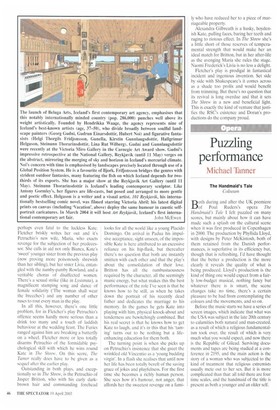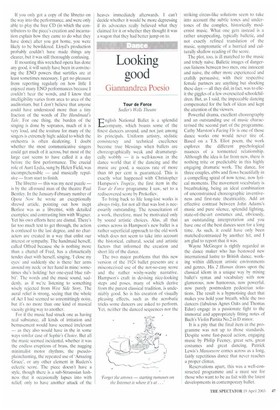Puzzling performance
Michael Tanner
The Handmaid's Tale Coliseum
Doth during and after the UK premiere
of Poul Ruders's opera The Handmaid's Tale I felt puzzled on many scores, but mainly about how it can have made such a splash on the cultural scene when it was first produced in Copenhagen in 2000. The production by Phyllida Lloyd, with designs by Peter McKintosh, both of them retained from the Danish performances, is superlative in its efficiency but, though that is refreshing. I'd have thought that the better a production is the more clearly it reveals the quality of what is being produced. Lloyd's production is the kind of thing one would expect from a fairly low-budget musical, nothing fancy but whatever there is is smart, the scene changes take no time, there's a certain pleasure to be had from contemplating the colours and the movements, and so on.
Before the music starts we have a series of screen images, which indicate that what was the USA was subject in the late 20th century to calamities both natural and man-created, as a result of which a religious fundamentalism took over, the result of which is very much what you would expect, and now there is the Republic of Gilead. Surviving documents and tapes are being studied at a conference in 2195, and the main action is the story of a woman who was subjected to the kind of treatment that religious extremists usually mete out to her sex. But it is more complicated than that: all told there are four time scales, and the handmaid of the title is present as both a younger and an older self. If you only got a copy of the libretto on the way into the performance, and were only able to play the free CD (in which the contributors to the piece's creation and incarnation explain how they came to do what they have done) after you got home, you were likely to be bewildered. Lloyd's production probably couldn't have made things any clearer, but it was still thoroughly confusing.
If mounting this wretched opera has done any good, it will surely have been in convincing the ENO powers that surtitles are at least sometimes necessary. I get no pleasure from reporting regularly on how little I enjoyed many ENO performances because I couldn't hear the words, and I know that intelligibility varies from area to area of the auditorium. but I don't believe that anyone could have understood more than a tiny fraction of the words of The Handmaid's Tale. For one thing, the burden of the singing is done by sopranos, much of it is very loud, and the tessitura for many of the singers is extremely high; added to which the orchestra is often deafening. I doubt whether the most communicative singers could get much of it across, but most of the large cast seems to have called it a day before the first performance. The crucial role of Aunt Lydia, sung by Helen Field, was incomprehensible and musically repulsive — from start to finish.
The libretto — this was my next puzzle — is by the all-round man of the theatre Paul Bentley. In the January-February number of Opera Now he wrote an exceptionally shrewd article, pointing out how inept Berlioz was as a librettist, with detailed examples; and contrasting him with Wagner. Yet his own efforts here are dismal. There's far too much text to get through, the action is confused to the last degree, and no characters are created in a way that enlist our interest or sympathy. The handmaid herself, called Offred because she is nothing more than a chattel of Fred, has a climactically tender duet with herself, singing, 'I close my eyes/ and suddenly she is there/ her arms around my neck/ or her hand in mine/ sometimes she's holding/ her one-eyed blue rabbit'. The words and the music sound, suddenly, as if we're listening to something wisely rejected from West Side Story. The aural relief is strong, seeing that the whole of Act I had seemed so unremittingly noisy, but it's no more than one kind of musical vacuity giving way to another.
For if the music had struck one as having real substance, all kinds of irritation and bemusement would have seemed irrelevant — as they also would have in the in some ways similar case of Sophie's Choice. But all the music seemed incidental, whether it was the endless eruptions of brass, the nagging minimalist motor rhythms, the pseudoplainchanting, the repeated use of 'Amazing Grace', or any other element in Ruders's eclectic score. The piece doesn't have a style, though there is a sub-Straussian lushness that it occasionally lapses into with relief; only to have another attack of the heaves immediately afterwards. I can't decide whether it would be more depressing if its advocates really believed what they claimed for it or whether they thought it was a wagon that they had better jump on to.



































































 Previous page
Previous page